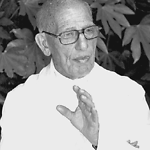Person
Gottschalk, Alfred (1894 - 1973)
FAA

Alfred Gottschalk
Details
- Born
- 22 April 1894
Aachen, Germany - Died
- 4 October 1973
Tübingen, Germany - Occupation
- Biochemist and Medical scientist
Summary
Alfred Gottschalk was Professor at the Max Planck Institute of Virus Research, Germany 1963-1968. He was a research biochemist at the Walter and Eliza Hall Institute of Medical Research 1939-1959 and a Fellow at the Australian National University 1959-1963. His studies of the action of viral enzymes on muco-proteins clarified knowledge of the carbohydrate moiety of the glyco-proteins and later work also made important contributions to both protein chemistry and virology. The Gottschalk Medal has been awarded annually by the Australian Academy of Science to recognise outstanding research in the medical sciences by researchers up to ten years after the completion of their PhD studies.
Details
Chronology
- 1920
- Education - Educated Universities of Munich, Freiberg and Bonn (MD, Bonn 1920)
- 1920 - 1922
- Education - Postgraduate studies in biochemistry, Universities of Frankfurt (Main) and Würzburg, Germany
- 1923 - 1926
- Career position - Associate, Kaiser Wilhelm Institute of Biochemistry, Berlin-Dahlem, Germany
- 1926 - 1935
- Career position - Director, Biochemical Department, Stettin General Hospital, Germany
- 1935 - 1939
- Career position - In private medical practice
- 1935 - 1939
- Career position - Research Biochemist, Walter and Eliza Hall Institute of Medical Research
- 1942 - 1948
- Career position - Instructor in organic chemistry and biochemistry (part-time), Melbourne Technical College
- 1945
- Life event - Naturalised as an Australian citizen
- 1949 -
- Career position - Lecturer in biochemistry (part-time), University of Melbourne
- 1949
- Education - DSc, University of Melbourne
- 1951
- Award - David Syme Research Prize (jointly), University of Melbourne
- 1951 - 1953
- Award - Fellow, Australian Chemical Institute
- 1951 - 1973
- Award - Fellow, Royal Institute of Chemistry, United Kingdom
- 1953 - 1973
- Award - Fellow, Royal Australian Chemical Institute
- 1954
- Award - H.G. Smith Medal, Royal Australian Chemical Institute
- 1954 - 1958
- Career position - Secretary, Victorian Group, Australian Academy of Science
- 1954 - 1973
- Award - Fellow, Australian Academy of Science
- 1959
- Life event - Retired
- 1959 - 1963
- Career position - Honorary Fellow, Australian National University
- 1963 - 1968
- Career position - Professor, Max-Planck-Institute of Virus Research, Tübingen, Germany
- 1966 -
- Career position - Honorary Professor, University of Tübingen, Germany
- 1966 - 1973
- Award - Fellow, American Association for the Advancement of Science
- 1969
- Award - Honorary MD, University of Münster, Germany
Related entries
Archival resources
Adolph Basser Library, Australian Academy of Science
Published resources
Encyclopedia of Australian Science and Innovation Exhibitions
- Smith, Ailie, Adolph Basser Library Manuscript Collection, eScholarship Research Centre, 2012, http://www.eoas.info/basser_browse.html. Details
Book Sections
- Fenner, Frank, 'Gottschalk, Alfred (1894-1973), Medical Scientist' in Australian Dictionary of Biography, John Ritchie, ed., vol. 14 (Melbourne: Melbourne University Press, 1996), pp. 302-303. http://www.adb.online.anu.edu.au/biogs/A140341b.htm. Details
Journal Articles
- Trikojus, V. M., 'Alfred Gottschalk', Records of the Australian Academy of Science, 3 (1) (1975), 52-74. Details
Resources
- Wikidata, http://www.wikidata.org/entity/Q4722748. Details
- VIAF - Virtual International Authority File, OCLC, https://viaf.org/viaf/206001372. Details
- 'Gottschalk, Alfred (1894-1973)', Trove, National Library of Australia, 2009, https://nla.gov.au/nla.party-1467830. Details
Resource Sections
- 'Gottschalk, Alfred - Ms 80', in Listing of Adolph Basser Library holdings, Australian Academy of Science, 1994, http://www.science.org.au/basser/manuscript-collection/ms080.html. Details
- Trikojus, V. M., 'Alfred Gottschalk 1894-1973', in Australian Academy of Science Biographical Memoirs, Australian Academy of Science, 2006, https://www.science.org.au/fellowship/fellows/biographical-memoirs/alfred-gottschalk-1894-1973. Details
See also
- Fenner, F., 'Frank Macfarlane Burnet, 1899-1985', Historical Records of Australian Science, 7 (1) (1987), 39-77. https://doi.org/10.1071/HR9870710039. Details
- Legge, J. W.; and Gibson, F., 'Victor Martin Trikojus, 1902-1985', Historical Records of Australian Science, 6 (4) (1987), 519-531. https://doi.org/10.1071/HR9870640519. Details
Digital resources
Rosanne Walker
Created: 20 October 1993, Last modified: 10 October 2019
- Foundation Supporter - Committee to Review Australian Studies in Tertiary Education
